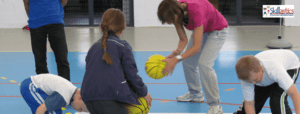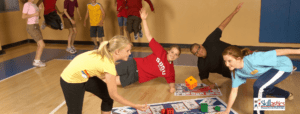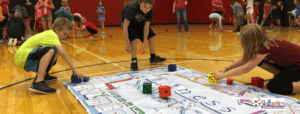Our bodies really are a machine; an amazing and organized system that works hard to keep us going. Every function of our circulatory, respiratory, musculoskeletal, and other systems work in conjunction, relying on each other to create the incredible result that is the body.
Lifting that spoon of cereal to your mouth takes a host of functions that interact and coordinate to make it possible to eat. Remove one, and suddenly, cereal falls off the spoon or never even leaves the bowl. Everything must work together and function well.
So, we care for our bodies, and we exercise to keep the systems healthy. And, the sooner we start, the better the body develops into a healthier machine. That means starting fitness young is key.
Machine Care Instructions
If our bodies are a machine, then the heart is the engine and the brain is the power switch. Both are vital, but brain functions pre-empt the heart. While we need to stay active so our heart can run the systems relying on it, the brain is the on/off switch that keeps it going.
The brain not only guides our actions and behaviors but directs our body to perform every function, including the heart. It’s the onboard computer system that makes everything work together. For children, brain function is vital to development, and anything that affects a developing brain must receive due attention.
So, while much of fitness focuses on the physical body and heart health, this focus should not eclipse the importance the role fitness has on children’s mental health. There are major ways that exercise improves children’s abilities to think and feel, which is why this is such a vital and significant effect.
1. Endorphins
There are powerful brain chemicals at work that stimulate nerves and flood our brain cells to get us going. These chemicals, endorphins, are responsible for moods and a general sense of being. They are powerful because the right amounts can escalate our energy so that we feel amped up and excited about life, or the opposite – drained of energy and feeling blue, dejected, or depressed. When we exercise, our body releases endorphins that keep us feeling good and give the positive energy responsible for our motivation and productivity.
2. Hormones
Another powerful mix of chemicals in our body, hormones are mighty influencers on our physical and emotional wellbeing. From initiating to maintaining growth and maturity of the body, hormones are fascinating forces that benefit from exercise. Fitness keeps hormone levels in balance and prevents factors such as weight gain and restricted blood flow that can affect the release of hormone amounts.
3. Oxygen
We take our ability to breathe for granted because it’s regulated by our autonomic nervous system so that we don’t have to think to do it—it just gets done, all the time, automatically. However, this is a key and vital function because it provides and distributes oxygen to our bodies. Exercise affects this delivery system by bringing in more oxygen, thereby sending out more. In this way, our brain receives big oxygen boosts during activity and functions at an even higher capacity. The more oxygen received, the better the brain works.
It’s a Balancing Act
With all the brain chemistry and systems operating in balance, kids’ brainpower performs at optimal levels. They are their best and brightest versions of themselves with proper amounts of every chemical swirling around as it should, in addition to the right quantities of vitamins and nutrients working hard as well.
Regular exercise affects these balances and levels, creating ideal amounts with which to regulate the body. True health means the body, as well as the mind, is functioning well.
Conversely, a lack of exercise can adversely affect children’s well-being. From bad moods to serious medical conditions like mood disorders, depression, or diabetes, the absence of exercise can exacerbate childhood illnesses or states of mind. Feeling negative can be a result of low hormone levels, a sluggish endocrine system, or the inability to process a high caloric intake of sugar or fat.
And, it can become a vicious cycle; feeling bad may lead to worse eating habits, weight gain, or activity avoidance, further worsening the problems. In this way, a lack of exercise and fitness puts children at risk for mental health problems that could become potentially life-threating.
While exercise is not a magic bullet that makes problems go away, it certainly contributes to better health and overall well-being in children. When children feel a physical sense of strength and fitness at a young age, they are more likely to maintain a strong mental capacity that is cognitively and emotionally balanced, making it possible for them to be their best selves, in mind and body.
About the Author
Sandy Slade is the CEO & Founder of Skillastics®, the #1 on-site and virtual physical activity resource for groups of children of all sizes. The on-site programs are designed around Skillatsics Activity Kits. These Activity kits include an innovative technique of play, executed on an oversize mat, where up to 100 children can play at one time.
The virtual programs provide students with an amazing variety of physical activity experiences that consist of 30 days of content lasting 30-40 minutes a day taught by national experts.
Skillastics® is enjoyed by over 10 million students in more than 25,000 Physical Education and After School settings nationwide.
For more information, email info@skillastics.com or check out www.skillastics.com.





